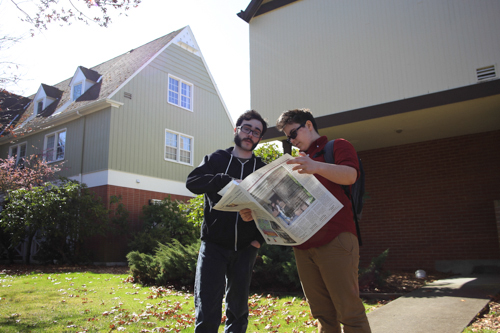Not to spoil the ending of the movie, but Osama bin Laden is killed. Shocking, I know, but when a movie is a retelling of historical events, there are no alternative endings. Anyone who saw Lincoln knows the film did not end with President Lincoln, having avoiding assassination, becoming a vampire slayer.
Zero Dark Thirty, directed by Katherine Bigalow, of Hurt Locker fame, and starring Jessica Chastain from The Help, is the story of the hunt for Osama bin Laden. Chastain plays Maya, a CIA analyst, who starting in 2003 spends her time combing through reports, data and interviews looking for the notorious terrorist.
Even before its release, the movie received criticism for its portrayal of torture in the search for bin Laden. There were multiple accusations that the movie overdid and glorified the torture scenes, arguing that it overstated the role of torture. Bigalow, for her part, denied these claims, saying that the movie was researched thoroughly and all the torture scenes were based on actual accounts.
In many ways, the debate should be about if the violence is founded in reality, rather than if it proves entertaining. This movie is not an action thriller; it focuses on the people behind the search, rather than those executing the orders. Thus, any attempts by the director to spice up otherwise mundane office scenes are well within her purview. Additionally, the movie is trying to get across to the audience the grittiness and tenacity of those involved, and what better way than to put Chastain through the wringer?
More to the point, though, the actors did a great job portraying the strain and intense pressure that the CIA analysts felt trying to find an elusive man. Throughout the film, the actors take the burden of finding bin Laden very personally, with every success and failure dictating their disposition. This movie is littered with actors from television and film, most of whom make the transition to serious roles seamlessly. The exception may be Chris Pratt—Andy Dwyer from NBC’s Parks and Recreation—who, despite a solid performance as one of the soldiers, fails to overcome his other role as a goofball.
This column has previously discussed the difficult position historical films are put in, either following history precisely and losing luster or deviating from actuality and losing credibility. The secretive nature of the hunt for Osama bin Laden, however, gives Zero Dark Thirty more leeway, and because so few people know what actually happened, whatever happens on the screen remains plausible. This movie certainly takes liberties with the plot and dialogue that a purely historical film would not, and that is for the best. Driving the story forward could have been a challenge, but the combination of a personal narrative and the overall search give the audience a compelling account.
This movie was a dark horse for the Best Picture award at the Academy Awards, losing out to a film with a similar focus. Argo deserved the award, a well acted and shot film that did not step on anyone’s toes; Zero Dark Thirty was the abrasive, gloomy version of Ben Affleck’s film, whose success came from its personal stories and tough subject. The Academy may not have been able to stomach the blood and bombs of Zero Dark Thirty, but do not let that dissuade you from seeing the film. By not addressing the more difficult aspects of the story, Affleck’s film pales to the more real and honest version told by Bigalow’s.
Go see this film to admire a strong and competent female lead, get a large dose of patriotism and to see a film that is actually “based on a true story.”
Zero Dark Thirty plays April 17–19 in Rausch Auditorium, Friday and Saturday at 8 and 10:30 p.m., Sunday 2 and 8 p.m. Tickets are $1 at the door.
The Student Vote film is being played April 24 in Rausch Auditorium at 7:30 p.m. Tickets $1 at the door. More info: Campusfilms@ups.edu.


